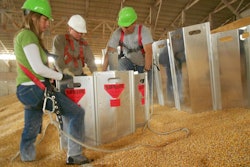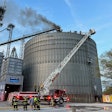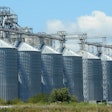
The annual summary recording nationwide grain dust bin explosions reported nine incidents in 2022. This compares to seven reported incidents in 2021 and a 10-year average of 7.8 explosions annually.
Kingsly Ambrose,Purdue Universityprofessor of agricultural and biological engineering and report author, said that despite the increase in explosions from the previous year and 18 total injuries this year, no fatalities were reported.
Fuel source for all incidents was grain dust
The explosions occurred in one ethanol plant, two feed mills, two grain elevators, two rice mills and two grain processing plants.
The probable ignition sources were identified in three cases as a fire and one incidence as welding, while five cases were from unknown sources.
Fuel sources for all nine explosions were identified as grain dust.
The dust explosions occurred in seven different states, with two each occurring in Arkansas and Louisiana, and one each in New Mexico, Illinois, Iowa, Kansas and Ohio.
“Often,five of the conditions needed for a grain dust explosionto occur are present in most grain feed, milling and processing facilities,” Ambrose said. “These conditions include dust, dispersed dust, confined space and oxygen. The presence of the fifth factor, an ignition source such as overheated bearing or mechanical friction, could lead to an explosion.”
He emphasized the importance of developing and implementing adetailed housekeeping programto mitigate the hazards and utilizing government and industry resources that are publicly available to provide guidance on developing such a program.
Related reading
Grain dust suppression tools to minimize explosion hazards





















